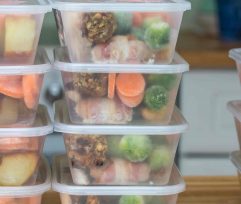Bloat affects everyone differently. But, whether it’s excessive gas or painful swelling of the abdomen, the one thing we can all agree on is we want to get rid of it. There are a handful of reasons for bloating and it can be difficult (not to mention frustrating) to pinpoint your exact cause in hindsight. However, if you can gain a clear idea of triggers today, you can take steps ahead of time in order to prevent “the dreaded swell” of tomorrow. Experiment with each tip below and see what your body responds to best:
1. Avoid/cut back on sugar alcohols
This may be a difficult task for many, especially those of us who love our protein bars. Sugar alcohol is a hybrid of molecules. Its purposes are to taste sweet and help cut you back on calories by being purposefully hard to digest. As a result, this popular weight-loss ingredient often ferments in the gut, wreaking havoc by producing flatulence, bloat, cramps and sometimes diarrhea. Foods such as low-calorie candy, gum, ice cream, baked goods, fruit spreads, lozenges, health bars and workout powders are all known culprits of using sugar alcohols. Check labels at the grocery store for ingredients such as Sorbitol, Xylitol, Ertyhritol, Isomat, Lactitol, Maltitol, Mannitol and Hydrogenated Starch Hydrolysates. They may have subtle names, but beware of their not-so-subtle effects. Speaking from personal experience, I’ve found that the poison lies within the dosage. As long I don’t consume large amounts of sugar alcohols on a daily basis, the bloat tends to stay at bay.
2. Work with your gut, not against it
Just because you haven’t been diagnosed with IBS or IBD doesn’t mean you are incapable of having a sensitive digestive system. The fluctuating terrain of our gut flora can often have an effect on how well we combat bloat from eating certain foods. Supplements such chlorella and adult probiotics can help foster the healthy flora we need for successful digestion. In contrast, when we indulge in treats like alcohol or take laxatives (an unhealthy, destructive short-term solution many are tempted to try) we damage the bacterial digestive helpers our bodies need. And, as we know by now, when food is poorly digested, we suffer via the infamous bloat.

3. Drink more water… and then go drink some more
You’ve heard it once and you’re about to hear it again: drink more water. When our bodies are properly hydrated we are better equipped to keep “everything” moving smoothly throughout our system. In fact, a lot of bloat is actually rooted in constipation. To combat this problem, engage in regular exercise throughout your week, watch your fiber levels and, once again, drink enough water. Hydration needs can vary by lifestyle, gender, age and activity level, but the Institute of Medicine recommends that women drink an average of 2.7 liters, or 11 cups, daily. It’s a daunting amount of H2O, but the Mayo Clinic assures that only 8 of those cups should be actual glasses of fluid. Drinking other beverages such as milk, tea or juice all contribute to your daily hydration number and foods such as watermelon, cucumbers, lettuce, celery, tomatoes and grapefruit all count as water sources as well.
Also, ask yourself: How much sodium and how many grams of carbohydrates am I consuming daily? Don’t know? It could be helpful to do some light tracking. For sodium specifically, the recommended daily intake is less than 2,300 mg, according to the Dietary Guidelines for Americans. When you spike the body with high amounts of sodium or carbs, the shock can lead to extreme fluid buildup and water retaining in the body, especially when you’re dehydrated. When you know you’ve had a high intake of these bloating offenders, aid your body by drinking more water than usual throughout the following day. Additionally, try eating potassium-rich foods to balance sodium levels, eat or drink natural diuretics and give the system roughly 2-4 days to reset itself. Do your job of keeping your body hydrated and it’ll return the favor with a flatter tummy.
4. Practice portion control
Ever taken “Before” and “After” shots of your tummy after Thanksgiving dinner? The difference is comical. But many forget that that situation is a common occurrence year-round. When you eat huge portions, the food has to go somewhere! Rather than spending the day in a calorie deficit, try eating smaller meals dispersed throughout your routine. This practice will make digestion an easier task for the body and help maintain your flat tummy you so happily woke up with this morning.
Above all, understand that bloat is a very normal, universal occurrence. It’s all a part of being human and there’s nothing wrong with a rounder tummy from time to time. Everyone bloats, so never constantly compromise life’s memories or fun today for a flatter stomach tomorrow. In moments of harsh self-critique, standing by a mirror and loathing over appearance, remind yourself instead of all the incredible abilities your physical form has. Your body is an amazing machine.





